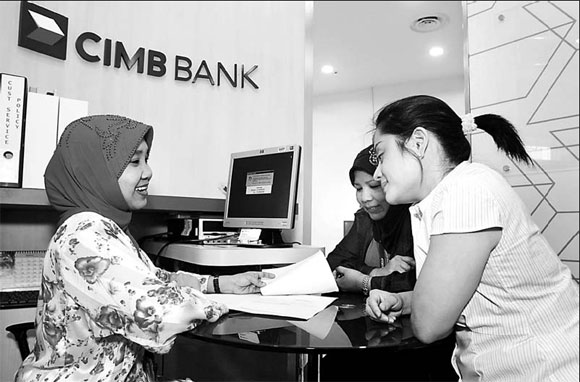Islamic bonds offer way to sidestep slump
|
A CIMB Bank employee talks to customers in Kuala Lumpur, Malaysia. Bloomberg News |
Islamic bond sales jumped 70 percent last year as borrowers led by Gulf Arab companies sidestepped the credit market slump triggered by record defaults on US home loans.
Global sales of so-called sukuk rose to $30.8 billion, from $18.1 billion in 2006, according to data compiled by Bloomberg. Borrowers in Gulf nations including Saudi Arabia and the United Arab Emirates (UAE) sold $17.9 billion of the securities, 75 percent more than the previous year.
"Most sukuk sales come from the Middle East and Asia, which are firing on all cylinders while the US and Europe are hampered by the subprime crisis," Arul Kandasamy, Dubai-based head of Islamic finance for Barclays Capital, said.
Saudi Electricity Co, the kingdom's largest power producer, and Aldar Properties PJSC, Abu Dhabi's biggest property developer, were among companies selling sukuk for the first time, spurred by economic growth as oil prices soared. In the European bond market, sales fell by 1 percent from 2006, their first decline since 2000, after companies abandoned plans as borrowing costs jumped to a five-year high.
HSBC Holdings Plc, the biggest manager of sukuk sales worldwide this year after Malaysia-based CIMB Bhd, in October started the first index of Middle East corporate bonds, including Islamic securities.
Trading in regional debt jumped more than fourfold in the first half of 2007 as overseas investors were attracted to the market, according to Neil Foster, HSBC's head of global markets for the Middle East.
Developer Nakheel PJSC, business park operator Jebel Ali Free Zone FZE and the Ras al-Khaimah Investment Authority were among UAE sellers of Islamic bonds in the second half even as the yield premium investors demand to hold Gulf corporate sukuk more than doubled in the period.
Gulf companies may sell a record $50 billion of conventional and Islamic bonds this year as they seek money for expansion and revive about $10 billion of sales delayed from last year, Philipp Lotter, senior credit analyst for Moody's Investors Service in Dubai, said in a December 24 interview.
Economies in the Middle East will expand 9.2 percent this year as oil revenue spurs government spending on railways, power plants and business parks, according to Morgan Stanley.
That's almost double the 4.8 percent global growth projection by the Washington-based International Monetary Fund.
Gulf sukuk sales will probably increase by about 50 percent this year and Asian sales by about 40 percent as the Islamic debt markets mature, Barclays' Kandasamy said.
Sukuk are typically issued using assets from which investors earn a predetermined return instead of interest, which is forbidden under Islamic Shariah law.
Agencies
(China Daily 01/02/2008 page17)















